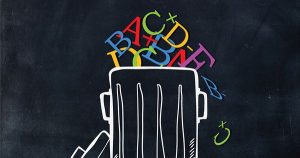Student Reflections about Communicating Student Learning (Guest Blogger, Jessica Hall, Head Teacher)
January 13, 2017 - 3 minutes readIn West Vancouver, the new Communicating Student Learning Document has generated discussion between educators, about the implementation of student approaches to learning, reflection and assessment. The new BC Curriculum holds the potential to empower students to use questioning techniques that guide their own inquiries.
Throughout this time of change, a question that has come to mind is: How have students conceptualized the assessment and reporting practices brought about by the new curriculum?
This year, I have the pleasure of teaching a Grade 5/6 combined class of thirty eager students. With the launch of a  new Communicating Student Learning Template, discussions around report cards have become more prevalent, and recently there has been a noticeable change in student viewpoints. The days when interpretations of high letter grades equate to a new toy or monetary rewards could very well be a thing of the past. In Division 2, my Grade 5 students have experienced pilot versions of the Communicating Student Learning document for two years; however, my Grade 6 students are about to experience a “grade less” report card for the very first time.
new Communicating Student Learning Template, discussions around report cards have become more prevalent, and recently there has been a noticeable change in student viewpoints. The days when interpretations of high letter grades equate to a new toy or monetary rewards could very well be a thing of the past. In Division 2, my Grade 5 students have experienced pilot versions of the Communicating Student Learning document for two years; however, my Grade 6 students are about to experience a “grade less” report card for the very first time.
The range of experience with new reporting practices amongst my students is broad and in trying to bring about some collective understanding, I sparked up a conversation about the “new” report cards. I wanted to know how students have perceived this change of not having letter grades listed on their report cards. Grade 6 students immediately expressed a sense of relief over not being labeled with a single grade. In a conversation with one Grade 6 student, he explained that the language in the new Communicating Student Learning Document was more descriptive than a letter grade. He stated that in general, the word “developing” has a less negative connotation and that he liked how the Core Competencies provide explicit examples on how to improve learning skills. A Grade 5 student articulated the first moment she understood that ‘communicating ideas’ is a learning skill. She explained that the Core Competencies have helped her identify and value her personal learning style as the “presenter” and that she prefers working in groups, where she has the opportunity to “share her ideas in classroom discussions”.
Overall, the revised BC Curriculum promotes greater participation of students in their own education. Monitoring progress in student response to inquiry learning presents both awareness and opportunities for teachers and students to evaluate the effectiveness of their respective roles. Ongoing conversations about the Communicating Student Learning Document with our students are crucial to their understanding of the language within the document.